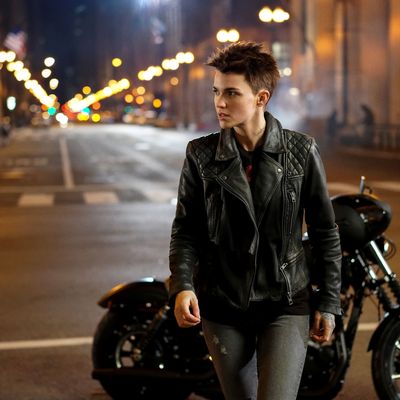
Near the end of Batwoman’s pilot episode, airing Sunday, Kate Kane (Ruby Rose) stands on the edge of a building overlooking the city she’s decided to protect, her cape billowing behind her in the night sky. An image clearly meant to evoke awe and grandeur, it instead hits like a thud — in part because of the cheap-looking costuming, haphazard choreography, and unconvincing potboiler dialogue that leads to this moment, but mostly because of all the wasted potential it embodies.
The new CW series — set within the Arrow universe, after star Ruby Rose’s debut as the character in last year’s crossover event — broadly pulls its story from the 2010 graphic novel Batwoman: Elegy (by Greg Rucka, with art by J.H. Williams III and colors by Dave Stewart). Kate Kane is a West Point dropout, having lost both her Army career and girlfriend Sophie (Meagan Tandy) in one fell swoop after refusing to hide that she’s a lesbian. As amber-toned flashbacks dictate, she also has tragedy in her past, having lost her mother and sister in a car accident from which Batman couldn’t save them. The show picks up three years after Bruce Wayne’s disappearance from Gotham, where Kate returns after hearing of Sophie’s kidnapping at the hands of main villain Alice and her Wonderland gang. While navigating the dynamics of her blended family, Kate learns of Bruce’s secret identity and picks up the mantle in order to protect Gotham.
On the surface this story presents a lot of opportunity to question notions of familial loyalty, identity, and trauma, but based on the first two episodes provided to critics, Batwoman doesn’t seem so sure of its own existence. In broadly adapting Elegy, the minds behind Batwoman — including creator and writer Caroline Dries and director Marcos Siega — leech out much of the story’s emotional bramble and intrigue. But even without considering the comics the show draws from, Batwoman offers scant pleasure that would separate it from the plethora of superhero stories saturating film and television today.
Going into Batwoman I wondered if the show would fall victim to Arrow’s problem of making Green Arrow into a Walmart-issued Batman, but the problem with Kate Kane isn’t that she’s been flattened into a watered-down version of Bruce Wayne. Rather, it’s that she exists too much in his shadow, with the leaden voice-over that drowns out the series taking its cues from the letters Kate writes Bruce. The show doesn’t seem to know how to handle Bruce’s absence, so he’s mentioned at every turn, making Kate feel less like a person with her own story than someone grafted onto his. Just as with Alice and the Wonderland gang — which are stripped of their supernatural and uncanny elements, making Alice come across as a grating Harley Quinn knockoff — Kate loses any sense of distinction that might make her approach to crime-fighting feel vibrant or intriguing. She’s just another street-level vigilante with no personality or style of her own to set her apart.
Batwoman’s inability to step out of Batman’s shadow wouldn’t be such a problem if anything else in the series clicked into place, but unfortunately there is little to hold onto. The show is as muddled visually as it is narratively, with heavy-handed, honey-hued flashbacks bursting into focus, sometimes without good reason, before the present-day scenes can gain any rhythm. Gotham is too clean, not lived-in enough to sell its storied history. The visual palette is all muddled grays or treacly, warmly lit flashbacks. The fight scenes lack tension and dynamism, relying on quick cuts and multiple angles to manufacture a false sense of energy.
There’s also a missing spark of chemistry among the cast. The scenes meant to show the connection between Sophie and Kate feel awkward, and Dougray Scott and Rose can’t sell their characters’ tense father-daughter dynamic. The flimsy backbone of the series is the push and pull between Kate and Alice, but a crucial scene in the second episode that sees the two characters playing off each other — affected by a reveal that they’re closer than Kate originally thought — lacks the verve necessary for the emotional throughline to work.
Batwoman clearly has a lot of kinks to work out based on these early episodes, but there is one problem that won’t be so easy to fix: Ruby Rose. She perpetually squints her eyes in a poor approximation of a scowl meant to show how tough and edgy the character is, but it only highlights the extent to which the character’s cocky bravado and thorny moral considerations have been sanded off in favor of something more easily recognizable. There’s little going on behind Rose’s narrowed eyes, making the role feel more like posturing than a lived-in character. It’s a textureless, bland, hollow performance that mutes the character’s potential to evolve into something more intriguing. There’s still a chance that Batwoman can grow more visually inventive and narratively dynamic from here, but if the heroine at its center isn’t strong enough, all the potential in the world won’t be enough to hold the series together.


